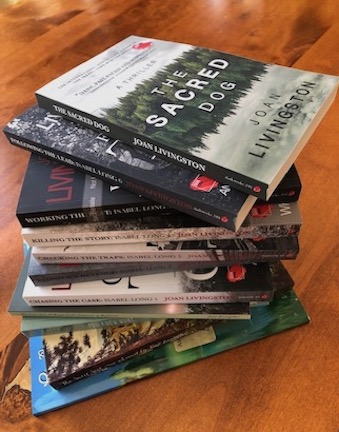It’s time to give a little love to The Sacred Dog and to Jenny Kitchen, one of my favorite characters in this novel. She is the feisty grandmother of one the main characters.
To backtrack a little, this novel centers on a feud between two men in a small town. Frank Hooker owns The Sacred Dog, a bar where the locals gather to drink and gab. The only one not welcome is Al Kitchen because Frank unfairly blames him for the death of his brother. Throw in a dark secret involving Frank’s wife. You know nothing good is going to come from this situation.
Al didn’t have it easy as a kid. His parents died when he was young, so he came to live with his grandparents. His grandfather was an abusive drunk. The only good thing he did for Al was to teach him to hit a baseball.
But Al has a strong ally in his grandmother, who had to put up with her own share of abuse. Probably the best thing that happened to Jenny is when her husband died of a heart attack in the junkyard behind their house. “Kitchen men are the meanest men. Don’t you ever be that way. Treat the people you love better,” she told Al after one such experience.
Jenny is tough. She has to be, living on social security and what Al, who continues to live with her as an adult, contributes to their household expenses.
She keeps to herself although she does have a few women friends in town. Al is the main person in her life although she can be tough on him. She wants him to do better.
She’s also Al’s biggest defender. His grandmother might not always have protected Al from Pops, but she stuck up for him when his teachers or the principal said he misbehaved in school. “Not my boy. You must be mistaken.”
Jenny is the one who got Frank Hooker to let her grandson back inside his bar. She may be short, but she looked up at Frank with defiant eyes while she negotiated a two drink maximum.
Then there are her cats, lots and lots of them, although like Al, she always has a favorite tom she lets inside the house.
Here’s scene from The Sacred Dog. Al is sitting in his first car in the junkyard behind the house he shares with his grandmother.
Al finished the joint when he heard the brakes on his grandmother’s car squeal as she backed it to the barn. He felt good and rubbery as he watched Ma open the trunk of her car. She bought it new after Pops died with his life insurance money. Now the car’s paint wouldn’t even hold onto a shine. Cats circled Ma’s ankles as she shuffled through the tall grass toward the barn. He laughed when she accidentally stepped on one of the cats and the thing squawked in pain. After a while, Ma walked into the barn and back outside, carrying a pail in little jerking motions toward the woods, shooing the cats away.
He lifted the bottle for another swig.
Al swore his grandmother must be made of cast iron, the way she was able to outlive that son of a bitch husband of hers. He saw photos of her when she was young, not a wrinkle on her almost pretty face. Her large, crooked mouth marred it. She used to have hair the same color as Al, a red that looked as if the strands had rusted in the rain. His eyes traced her wander into the woods. He spotted her flowered housedress between the trees, and then she returned to the barn. She was hollering for him, and Al started to laugh when he saw her try to lift the bags of cat food from the trunk of the car. He never saw Ma wear anything new, but she spent a fortune feeding her cats.
He slipped from the Mustang.
“Need somethin’, Ma?” Al said as he approached his grandmother.
“Where you’ve been, Al? I’ve been callin’ and callin’ you.”
“Just out back.”
She gave him a sniff and frowned.
“Out back where? A barroom?” She pointed to the bags. “Pour those bags into the metal barrel in the barn.”
Al hoisted a bag over each shoulder and followed his grandmother to the barn. He began teasing her about her cats, which were now in hiding. They all hated him. He didn’t blame them. They knew what would happen if he caught up with any of them. Ma lifted the top of the trashcan for him. He breathed through his mouth as he poured the contents of the bag into the barrel because the barn stunk of cat spray.
“Hey, Ma, tell me. What were you doin’ in the woods with the pail?”
His grandmother worked her mouth.
“One of my cats lost her litter, Queenie, the calico. She rolled on the three kittens and smothered them. So, I took their bodies in the pail to dump them in the woods.” Her eyes closed in a catlike squint. She scratched the back of her head. “When I looked them over, they seemed okay. But I guess cat mothers know when there’s somethin’ wrong with their young.”
LINKS:
You can find The Sacred Dog, in Kindle and paperback, on Amazon: https://mybook.to/thesacreddog
It is available in paperback at Barnes and Noble: https://bit.ly/40T2aou






